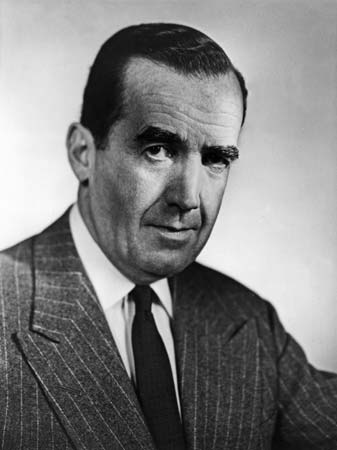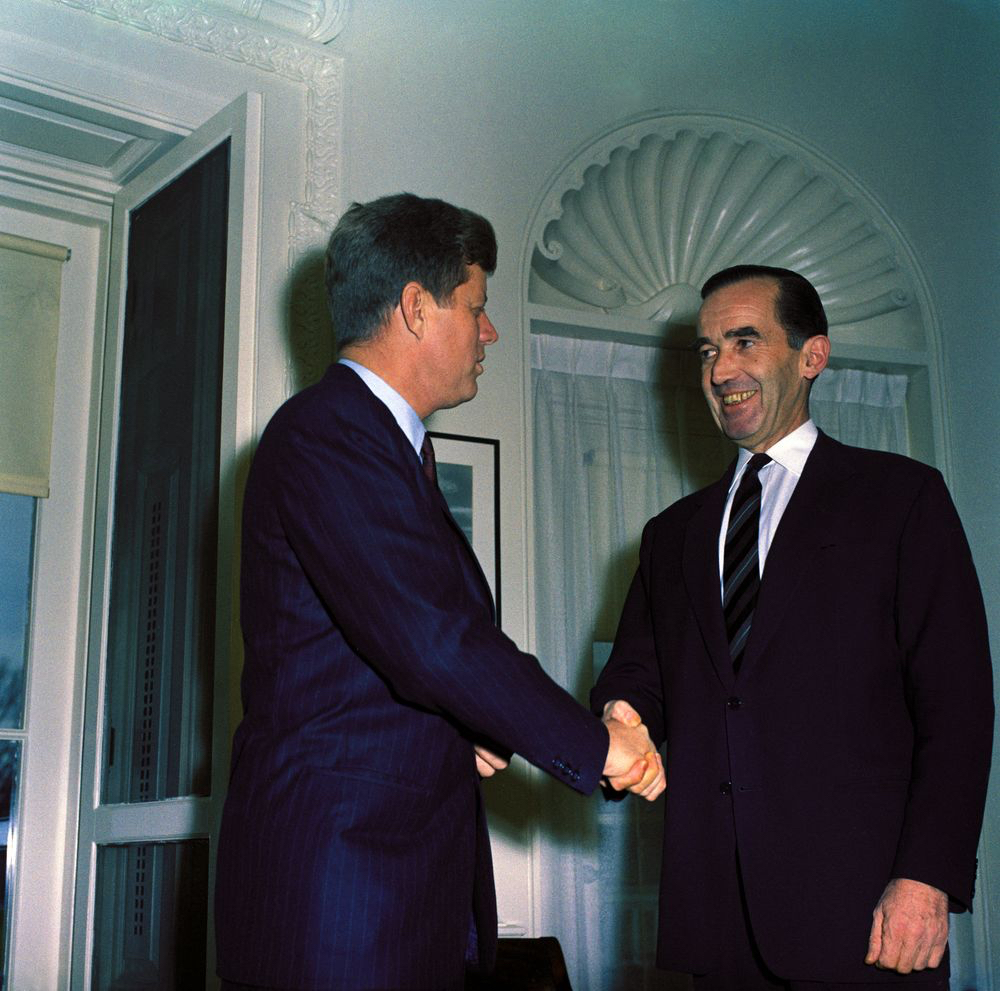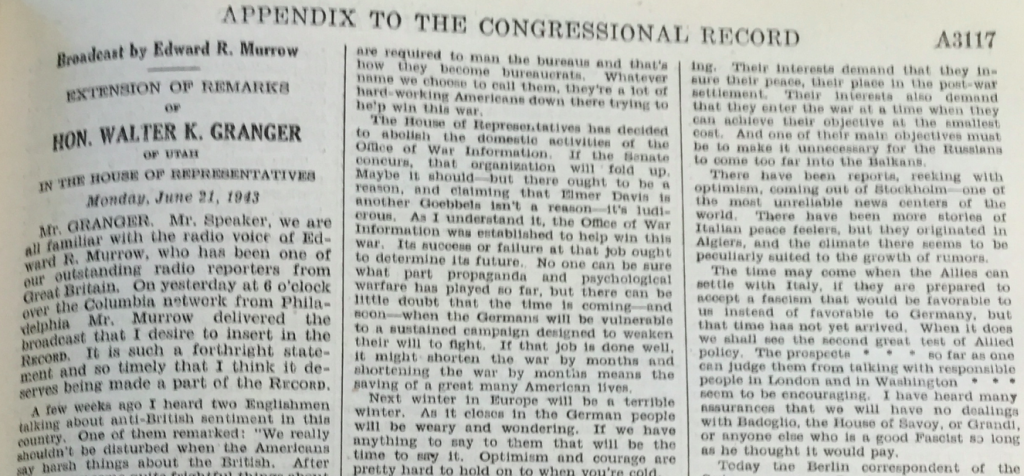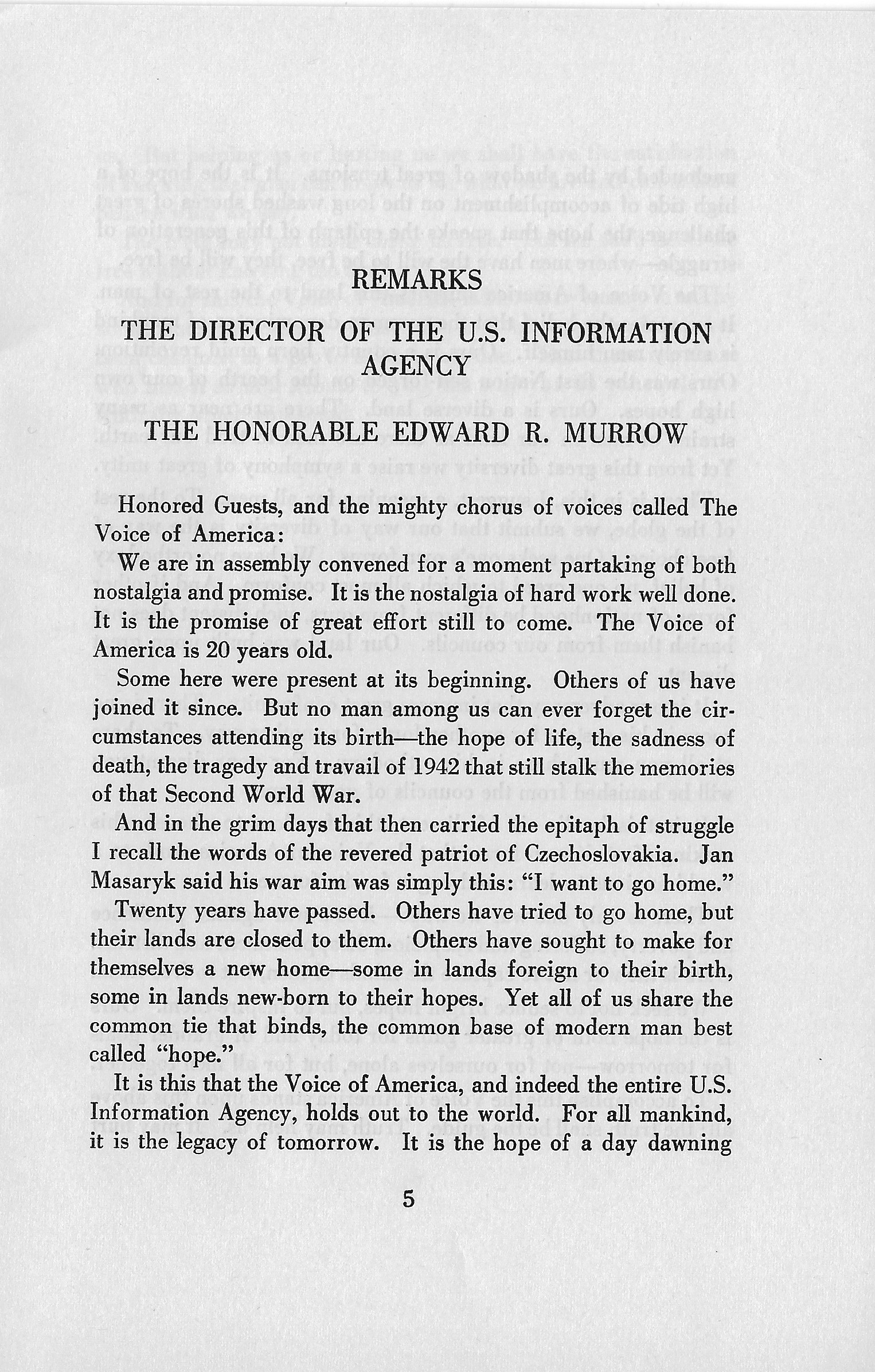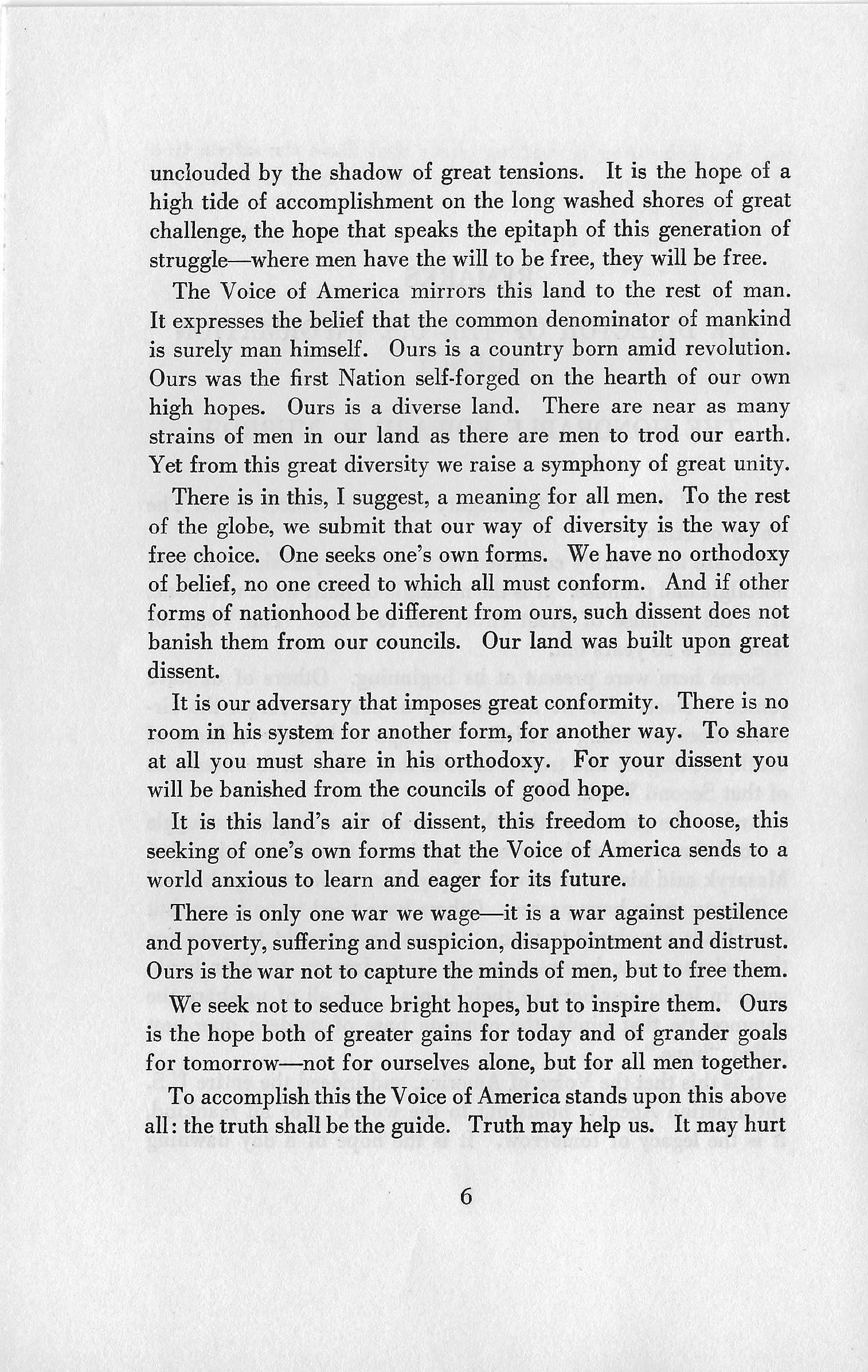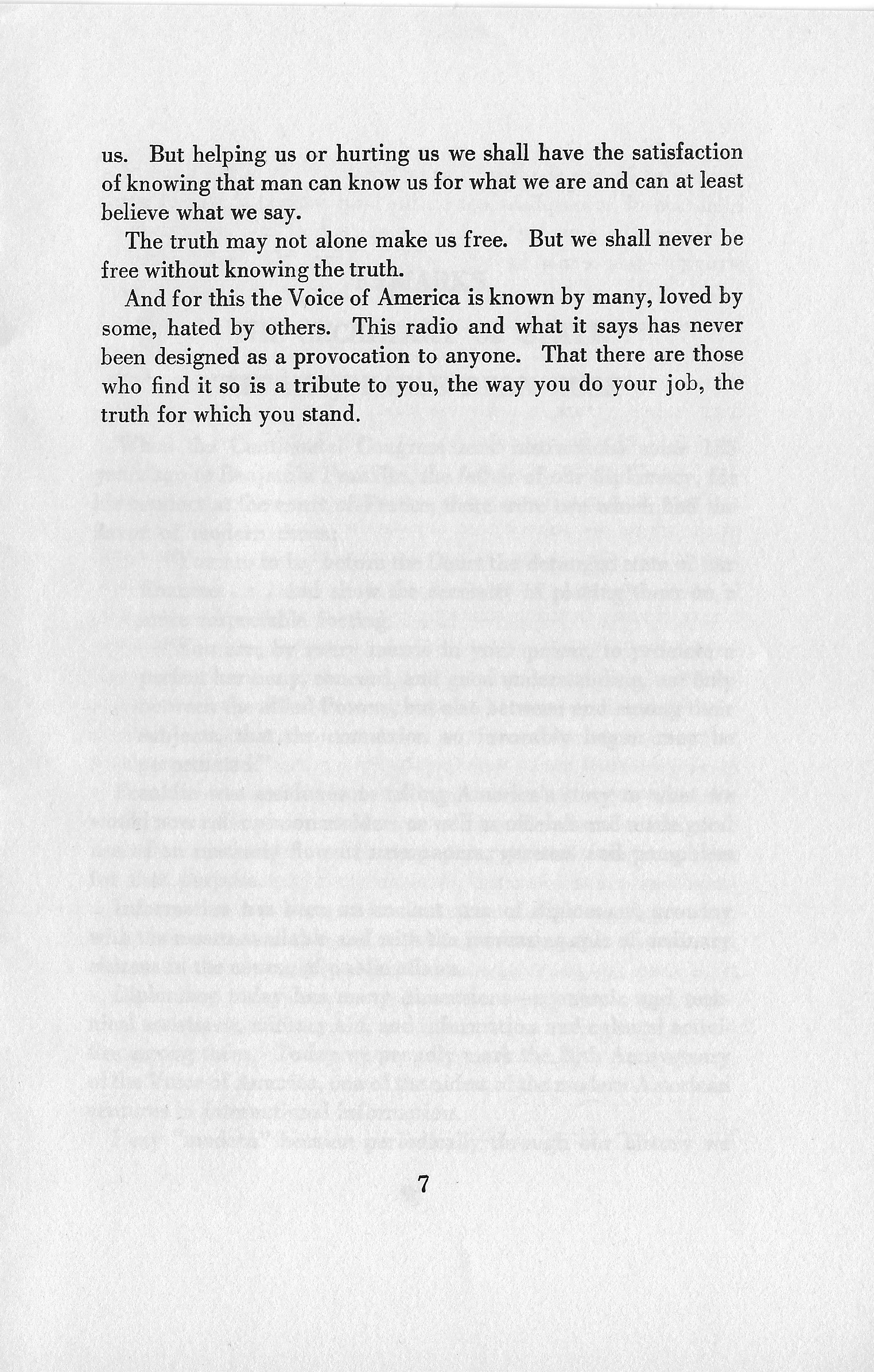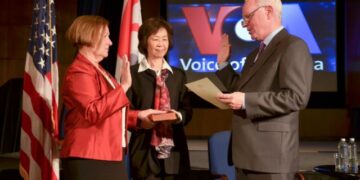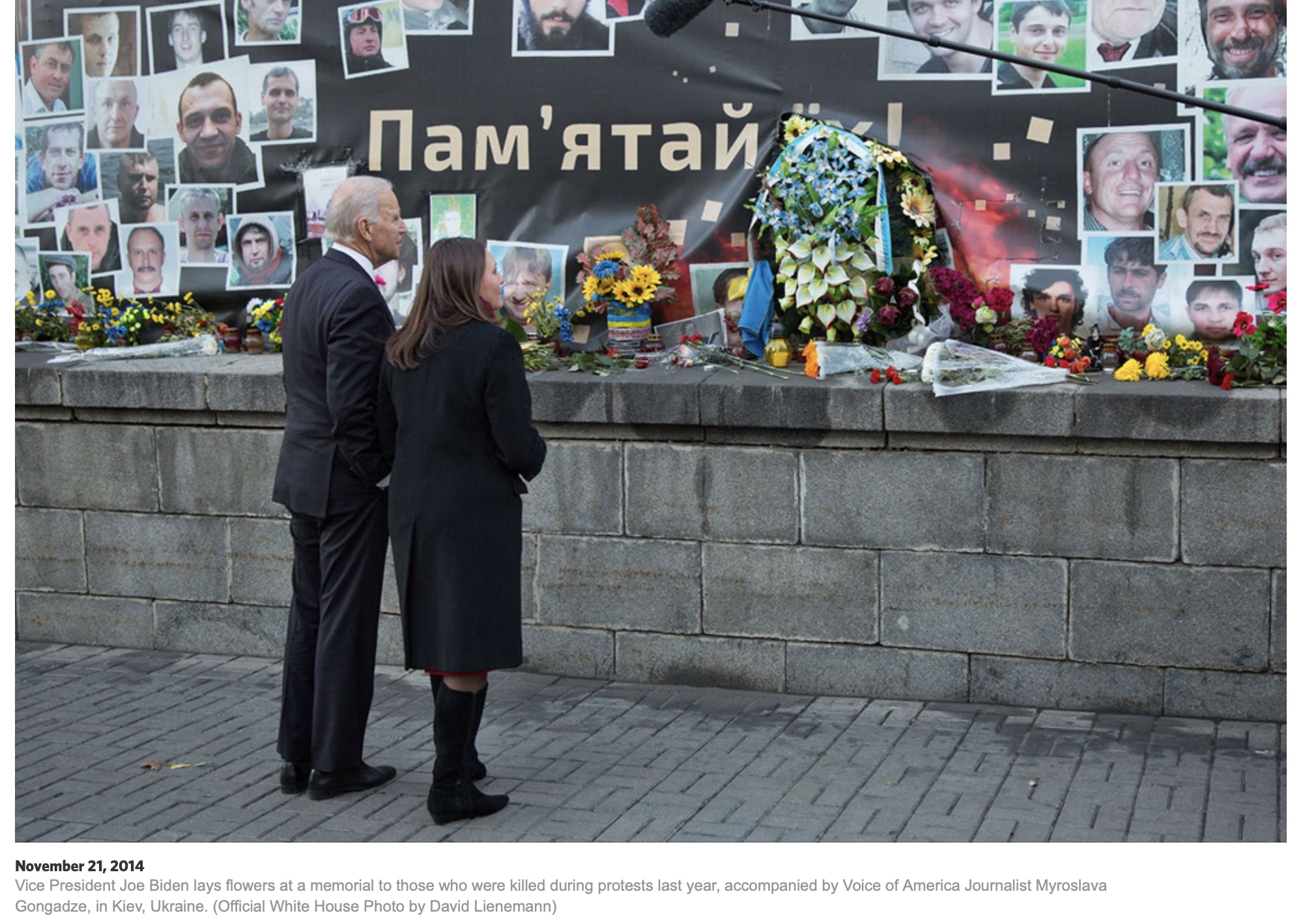OPINION
by Ted Lipien
Voice of America (VOA) directors and some of its current and former editors and reporters like to quote Edward R. Murrow, an American broadcast journalist who was director of the United States Information Agency (USIA) during President John F. Kennedy and Lyndon B. Johnson administrations, to signal their support for truthful journalism and their opposition to propaganda. In his USIA government position, Murrow was the boss of the VOA Director. The Voice of America was in the 1960s part of the United States Information Agency, although both USIA Director and VOA Director were then nominated by the President and confirmed by the U.S. Senate. Currently, only the CEO and Director of the U.S. Agency for Global Media (USAGM) is nominated by the President and confirmed by the U.S. Senate. The current USAGM CEO is Michael Pack whom President Trump nominated in 2017. He was confirmed by the U.S. Senate in 2020. He now has the full authority to select the next VOA Director who does not require confirmation by the U.S. Senate.
Many journalists now working for the Voice of America do not have a good grasp of their organization’s checkered history, as I pointed out when 14 VOA central English newsroom reporters inaccurately claimed in late August 2020 that “just as was the case with the McCarthy ‘Red Scare,’ which targeted VOA and other government organizations in the mid-1950’s, there has not been a single demonstrable case of any individual working for VOA — as the USAGM CEO puts it — ‘posing as a spy’.”[ref]Ted Lipien, “Dangerously naive VOA journalists make fools of themselves,” The Washington Examiner, October 8, 2020, https://www.washingtonexaminer.com/opinion/op-eds/dangerously-naive-voa-journalists-make-fools-of-themselves.[/ref] Some of them are dangerously naive — a journalistic naïveté born out of ignorance of history. Some who have invoked Edward R. Murrow in support of their arguments do not know that he would have never allowed biased partisan reporting or repetition without any challenge of Chinese propaganda, which recent VOA directors have failed to prevent.[ref]Free Media Online, “Two Minute Chinese Government Propaganda Video Produced by Voice of America,” YouTube, https://youtu.be/1e8lTfrYeMs.[/ref] Nor would Edward R. Murrow tolerated hiring former Russian state broadcasters who prior to being hired by VOA without a proper vetting produced anti-U.S. propaganda for their former Russian bosses.[ref]USAGM Watch, “Rep. Scott Perry Criticized USAGM and OTF for Mismanagement and Security Breaches,” September 30, 2020, https://bbgwatch.com/bbgwatch/rep-scott-perry-criticized-usagm-and-otf-for-mismanagement-and-security-breaches/.[/ref] Edward R. Murrow would also not have allowed the Voice of America to ignore news of foreign interference in U.S. elections in support of a U.S. politician, as VOA did in recent weeks.[ref]USAGM Watch, “Foreign Influence and Conflicts of Interest at Voice of America: Case of the Albanian Ambassador EXCLUSIVE,” October 5, 2020, https://bbgwatch.com/bbgwatch/foreign-influence-and-conflicts-of-interest-at-voice-of-america-case-of-the-albanian-ambassador-exclusive/.[/ref]
Today’s journalists may be vaguely aware of VOA’s successes during the Cold War but are largely ignorant of the organization’s many controversies and failures. They are not completely at fault. They have been fed falsehoods and half-truths by previous generations of VOA directors and journalists who themselves had been deceived by even earlier false historical accounts and very successful attempts to cover up examples of foreign interference with VOA programs, especially during VOA’s early years, but also extending into the Cold War. The Voice of America also made, of course, a major contribution to the fall of communism in Eastern Europe and in the Soviet Union, but even that period in VOA’s history is poorly understood and the contribution of anti-communist refugee journalists from Eastern Europe, the Soviet Union, China and other communist-ruled nations has been largely ignored by the mostly native-born, white and male VOA and agency leadership and central English editors and reporters. Anti-Nazi World War II hero and and anti-communist refugee Voice of America Polish journalist Zofia Korbońska was not recognized for her remarkable work at VOA until Michael Pack became USAGM CEO earlier this year and approved a special press release in her honor.[ref]U.S. Agency for Global Media, “USAGM honors VOA Polish broadcaster Zofia Korbońska,” Press Release, August 16, 2020, https://www.usagm.gov/2020/08/16/usagm-honors-voa-polish-broadcaster-zofia-korbonska/.[/ref] Recent VOA programs glorified American Communist Angela Davis[ref]Voice of America, “Activist Angela Davis Representing the Powerful Forces of Change Women’s March,” January 21, 2017, https://www.voanews.com/episode/activist-angela-davis-representing-powerful-forces-change-womens-march-3741326.[/ref], without identifying her as a Communist, and murderous Marxist revolutionary Che Guevara.[ref]Reuters on Voice of America, “Che Guevara Poster Artist Looks Back on 50 Revolutionary Years,” September 18, 2018, https://www.voanews.com/arts-culture/che-guevara-poster-artist-looks-back-50-revolutionary-years.[/ref]
VOA started to broadcast American and international news by shortwave radio in 1942 with the purpose of informing and influencing public opinion abroad shortly after America entered the war with Japan and Nazi Germany. The U.S. government discovered that unlike other major powers, the United States did not have state radio facilities to deliver American and foreign news to audiences abroad and to counter propaganda from enemy nations. A glorified but largely false and frequently repeated version of the Voice of America’s early history can be found in a November 27, 2018 Washington Post op-ed by the now former VOA Director Amanda Bennett[ref]Amanda Bennett, “Trump’s ‘worldwide network’ is a great idea. But it already exists.,” The Washington Post, November 27, 2018, https://www.washingtonpost.com/opinions/trumps-worldwide-network-is-a-great-idea-but-it-already-exists/2018/11/27/79b320bc-f269-11e8-bc79-68604ed88993_story.html.[/ref] and in various books about VOA, including Voice of America: A History by Alan L. Heil, Jr., a former VOA program director.[ref]Alan L. Heil, Jr., Voice of America: A History, (New York: Columbia University Press, 2003.[/ref]
The then VOA Director Amanda Bennett wrote in 2018:
“Those broadcasts were lifelines to millions. Even more important, however, was the promise made right from the start: ‘The news may be good for us. The news may be bad,’ said announcer William Harlan Hale. ‘But we shall tell you the truth.’”
What the now former VOA director wrote was not factually inaccurate, but it was far from the whole truth because it created a false impression of what VOA was like in those early years. There was VOA censorship to protect Stalin and the Soviet Union and heavy use of Soviet propaganda for establishing pro-Moscow governments in Europe after the war. Some former VOA journalists helped to create and defend these communist regimes with their propaganda — a shameful episode which has been largely erased from history which I have tried to document.[ref]Ted Lipien, “Voice of America Polish Writer Listed As His Job Reference Stalin’s KGB Agent of Influence Who Duped President Roosevelt,” Cold War Radio Museum, February 12, 2020, https://www.coldwarradiomuseum.com/voice-of-america-polish-editor-listed-stalins-kgb-agent-of-influence-as-job-reference/. “Mira Złotowska – Michałowska — Soviet influence at WWII Voice of America,” Cold War Radio Museum, December 2, 2019, https://www.coldwarradiomuseum.com/communist-mata-hari-at-wwii-voice-of-america/.[/ref]
Bennett also suggested in her November 2018 article that one of the great American early radio and television news reporters, Edward R. Murrow was linked to the creation of the Voice of America. She was vague, but her op-ed at least implied that Murrow was somehow responsible for truthful VOA news reporting from the moment the first broadcast went on the air in 1942. She would have been more accurate if she wrote that those who helped to create VOA followed in the footsteps of Pulitzer Prize-winning New York Times Moscow correspondent Walter Duranty who, because of his pro-Soviet and pro-communist bias, shamelessly lied about the starvation and death of millions of people in Ukraine and in other parts of the Soviet Union under Stalin’s rule.
Amanda Bennett wrote in 2018:
“Truth is the best propaganda, and lies are the worst,” said Edward R. Murrow, who helped create VOA.”
Murrow, however, had nothing to do with creating the Voice of America and with pro-Soviet Roosevelt administration officials and journalists put in charge of it during World War II. They got their propaganda news from Soviet Embassies in Washington and London. They listened to and believed in what Radio Moscow and their contacts within the Communist Party USA (some of the editors and broadcasters were party members) were saying. They rejected news about Stalin’s atrocities as anti-Soviet propaganda. An American communist who wrote this was Howard Fast, the 1953 winner of the Stalin Peace Prize who in 1943 was the Voice of America’s first chief news editor and writer.[ref]Cold War Radio Museum, “Stalin Prize-Winning Chief Writer of Voice of America News,” March 12, 2019, https://www.coldwarradiomuseum.com/stalin-prize-winning-former-chief-writer-of-voice-of-america-news/.[/ref]
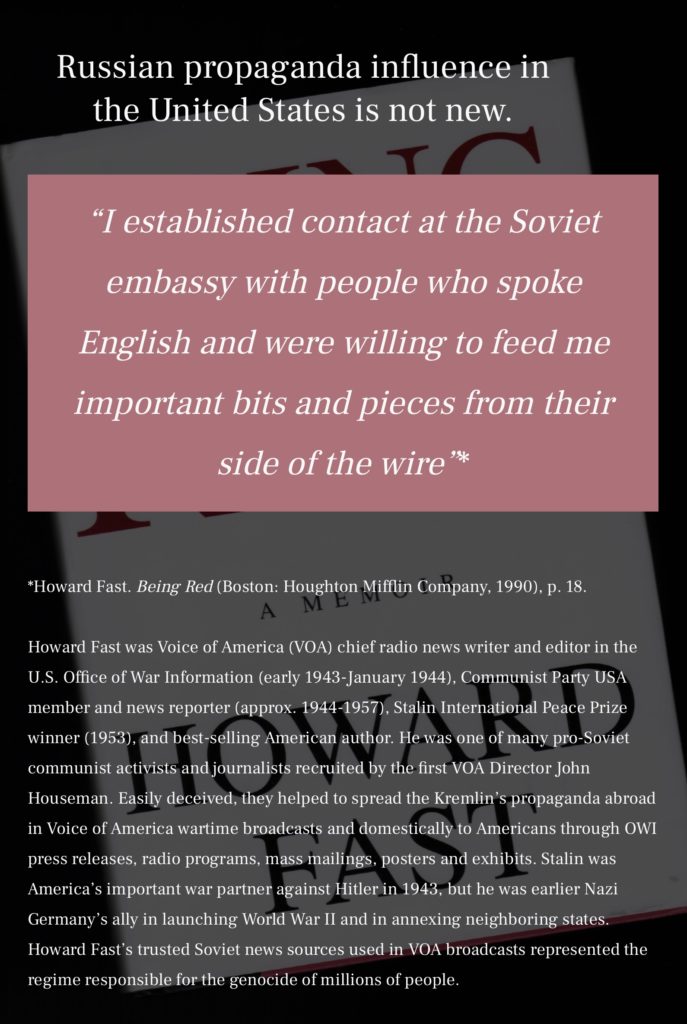
Howard Fast eventually left the Communist Party in 1956 or 1957, after Soviet leader Nikita Khrushchev revealed Stalin’s crimes, but he remained unapologetic about his promotion of Soviet “news” in VOA’s World War II broadcasts. His memoir Being Red, published in 1990, is a testimony to his journalistic naïveté, arrogance and ability to manipulate readers into believing that to fight Fascism one had to become a Communist. For a journalist, he was supremely naive. In a 1998 radio interview, he described how staff members of the Communist Daily Worker, where he was a reporter and editor, cried when they read Khrushchev’s speech for the first time:
“And we heard this speech, and many of us wept. Because we did not know, and would not believe, the truth about the Soviet Union.
We had erected a Socialist state to our beliefs and to our dreams, and this for us was the Soviet Union.”[ref]Pacifica Radio’s Democracy Now, April 8, 1998, “Interview with Howard Fast,” https://www.trussel.com/hf/democnow.htm.[/ref]
Edward R. Murrow, on the other hand, was a completely different type of a 20th century American radio journalist. As a CBS radio war reporter in Britain, he maintained contacts with representatives of democratic governments-in-exile representing countries conquered and occupied by Nazi Germany and in some cases also by Soviet Russia when Stalin was still Hitler’s ally. While reporting objectively on Russia, Murrow also sought and reported news he received from East European diplomats and other emigres. They were despised by Stalin and toward the end of the war were being increasingly vilified by Soviet propaganda for opposing communism and Soviet plans to establish un-democratic, satellite regimes in East-Central Europe after the war.
Unlike Murrow, a large number of VOA officials and news writers shared Stalin’s hostile attitude toward these smaller nations which were also part of the U.S.-British-led anti-Nazi alliance. Early VOA officials and editors ignored information from any news sources critical of the Soviet Union and eventually banned them almost completely from VOA programs. While the early Voice of America embraced and promoted Stalin’s propaganda lie about the Katyń massacre of thousands of Polish military officers, government workers and intellectual leaders, Murrow reported truthfully from London that the Soviets were the most likely perpetrators of the mass murders. While the early VOA lied about refugees[ref]Ted Lipien, “How the Roosevelt Administration Shipped Polish Refugee Orphans to Mexico In Locked Trains and Lied About It to Protect Stalin,” Cold War Radio Museum, https://www.coldwarradiomuseum.com/how-u.s.-shipped-polish-refugee-orphans-from-russia-to-mexico-in-locked-trains-and-lied-about-it-to-protect-stalin/.[/ref], including orphaned children, who had survived Stalin’s slave labor camps, Murrow reported such news with accuracy and concern for human rights.
To suggest therefore that Murrow had helped to create VOA stretches the truth. He was not anywhere near the Voice of America during World War II when VOA was created. It is true, however, that as a member of an independent commission, Murrow advised the U.S. government shortly after the war on information and public diplomacy programs, including Voice of America radio broadcasting which in 1945 was put by President Truman in the U.S. State Department. Murrow was named by President John F. Kennedy the United States Information Agency (USIA) director in 1961.
I’m absolutely sure that Edward R. Murrow would have been horrified today to see VOA constantly using and posting China’s COVID-19 official statistics without any disclaimers. He would be even more horrified seeing multiple videos of Chinese communist regime propagandists produced and posted online by the VOA Mandarin Service and even using their statements for headlines without any attached countervailing content. When Murrow was the head of USIA, VOA would not have even conceived of broadcasting a pro-John F. Kennedy election campaign video as the VOA Urdu Service did in 2020 with its pro-Joe Biden video.[ref]Free Media Online, “Voice of America VOA Urdu Service Joe Biden appeal for Muslim vote video,” July 31, 2020, https://youtu.be/r2iL0uy6iL8.[/ref] It would have been also completely inconceivable that under Murrow at USIA, any VOA language service would have produced a broadcast in which a candidate for President of the United States would be called “punk,” “dog,” “pig,” “con,” “buls**t artist,” “mutt,” “idiot,” “fool,” “bozo,” and “blatantly stupid” and physical violence against an American politician would be condoned.[ref]Free Media Online, “2016 Election Voice of America VOA Ukraine Service De Niro Video Attacking Trump, February 29, 2020, https://youtu.be/CGDVUOyQJAM.[/ref] The Voice of America Ukrainian Service did this in 2016.
As great a journalist as Edward R. Murrow was, even he compromised on journalism when put in a government position, but he regretted it and did not try to hide or excuse his mistakes. He encouraged production of broadcasts in defense of the United States and broadcasts to counter Soviet and communist propaganda, but for sure Edward R. Murrow would not have allowed VOA to broadcast communist Chinese or communist Russian propaganda without an immediate and strong challenge. He did not think that countering propaganda from repressive regimes promoting violent and non-democratic ideologies also counted as propaganda, because he knew the difference between the two. Not countering propaganda means repeating it and helping to spread it as news.
Edward R. Murrow was not perfect. There was the Harvest of Shame censorship attempt by him which backfired against him and and the U.S. government. The scandal erupted after President Kennedy made him USIA director and a member of the National Security Council and Murrow asked the BBC not to show his documentary Harvest of Shame about migrant workers in the United States. It was an apparent attempt to protect America’s image abroad. The BBC, which had acquired the rights to his program, refused his request and showed the documentary. The publicity about his initially secret intervention caused considerable embarrassment. But he handled the incident with grace and humility when publicly asked about it on March 24, 1961 by a journalist from the Voice of America Pakistani Service.
Question came from the Pakistan Service [Voice of America], direct and penetrating as I have learned to expect from all my friends in Pakistan. How in view of the fact that there have been two editorials do I deal with the program Harvest of Shame. I do it as I did. It was a program produced for domestic consumption. As was suggested in one of the editorials, to which you refer, my telephone call was both foolish and futile, and I did not become aware of which hat I was wearing. [Applause]
A few years ago I heard a Voice of America senior correspondent arguing that countering violent extremism in U.S. taxpayer-funded VOA programs is a bad idea.
“As a policy goal, I know of no one who would argue with the notion of countering violent extremism,” the VOA correspondent said.
But the growing focus on and funding of the initiative [‘Countering Violent Extremism’] within VOA and the apparent desire to involve journalists in pursuit of a policy goal casts doubt on our independence and our journalistic integrity.
In support of his argument, the VOA correspondent chose to quote Edward R. Murrow who, ironically, later became an official in charge of U.S. government’s public diplomacy.
It was Edward R. Murrow who once said: “To be persuasive we must be believable, to be believable we must be credible, to be credible we must be truthful.”
The VOA correspondent added:
Murrow’s picture still hangs in the VOA Newsroom, a reminder to all that our mission was, is and should remain credible journalism.
To hear that countering propaganda and violent extremists is something bad was a complete surprise to me. I did it when I was in charge of VOA’s Polish Service, one of VOA’s most successful foreign language services in the 1980s. I considered myself a follower of Edward R. Murrow.
He was, after all, a true hound of countering propaganda without crossing the line between truth and falsehood. He did it with a passion. Many VOA journalists even now counter propaganda without compromising their professional integrity. Some of them had lived in countries where they were fed propaganda. They know how to spot it and how to respond to it effectively, but fewer and fewer of them remain. Effective countering of propaganda requires from journalists expert knowledge, sophistication and subtlety which are now in short supply.
Edward R. Murrow was indeed a strong believer in news reporters telling the truth. He had a keen understanding of history, foreign policy and foreign cultures. But based on what he knew and the period during which he was active as a journalist and later as a government official, he had absolutely no qualms about the Voice of America being involved in exposing and countering propaganda. According to him, this was to be done not only with facts but also with ideas and commentaries.
Edward R. Murrow accepted the job of the public diplomacy (a polite term for propaganda) chief in the Kennedy administration in 1961 when he became director of the United States Information Agency. “Public diplomacy” was a new term used to describe U.S. government propaganda and all other PR and information outreach in support of U.S. foreign policy and in improving America’s image abroad.
But even before he joined the U.S. government, Edward R. Murrow applauded government efforts to counter propaganda of racial, ethnic and class hatred. In a 1943 radio broadcast, he strongly supported the activities of the Office of War Information (OWI) — VOA’s parent agency — precisely because he knew that VOA practiced anti-Nazi propaganda and even psychological warfare. He may have not known at the time that wartime VOA and its parent agency were also spreading Soviet propaganda and Soviet lies. This became a major controversy, one of many which led to the OWI being abolished in 1945 and to the passage of the 1948 Smith-Mundt Act which restricted use of public money to distribute VOA programs in the United States (some of the Smith-Mundt restrictions were recently weakened, which also produced a controversy). Shortly after the war’s end, VOA was moved to the State Department and in 1953 to the United States Information Agency.
During the Cold War, as a U.S. government official Edward R. Murrow led the propaganda war against the Soviet Union and against global communism.
In a declassified 1961 memo, as USIA director he wrote:
EDWARD R. MURROW: Decisions by the President call for an energetic campaign of persuasion — by diplomacy and propaganda — to unify Latin America against Castro, to isolate and ‘quarantine him,’ to nullify his potential for subversion, and ultimately so to weaken him in Cuba and in the rest of Latin America that his Cuban opponents (and Hemisphere pressures) can overthrow him.
In a 2015 U.S. News & World Report article “The Struggle to Propagate the Truth: Edward R. Murrow wouldn’t be surprised at all at the U.S. inability to win hearts and minds,” contributing editor James Warren argued that Edward R. Murrow wouldn’t be surprised at all at the U.S. government’s failure to win the propaganda war.[ref]James Warren, “The Struggle to Propagate the Truth: Edward R. Murrow wouldn’t be surprised at all at the U.S. inability to win hearts and minds,” U.S. News & World Report, December 30, 2015, https://www.usnews.com/opinion/articles/2015-12-30/the-us-propaganda-problems-predates-the-islamic-state-group-and-the-web.[/ref] The article attributes it largely to insufficient funding. I argued in an 2016 op-ed in Digital Journal that while more funding is definitely needed, America’s soft power will not become more effective without a complete overhaul of the federal agency in charge of it and without hiring competent managers and journalists.[ref]Ted Lipien, “Op-Ed: Reform needed for U.S. soft power to work,” Digital Journal, January 2, 2016, http://www.digitaljournal.com/news/world/op-ed-reform-needed-for-usa-soft-power-to-work/article/453670.[/ref]
At this point, Voice of America journalists who object to countering violent extremism should probably worry more instead about their agency being mismanaged, even defunct. They should worry whether some of their colleagues might be falling for Putin or Castro propaganda because of their poor knowledge of history.
The real problem now is not even inability to counter propaganda but VOA unintentionally reinforcing anti-American propaganda.
The real question is to whom these VOA journalists are accountable. Can the U.S. Agency for Global Media manage them as well as journalists working for several other USAGM media entities? Many experts think this job is too big for one person and one super-agency too big to produce quality media content of different kinds to many different audiences to achieve different goals from countering propaganda to promoting America’s image abroad. Supporters of reform have proposed splitting the agency into more manageable components.
I’ve seen too many poorly-researched, one-sided VOA news reports and commentaries which could very well be confused with those originating from the Foreign Ministry in Beijing, Russia’s RT or Radio Havana. While most of the VOA output is not tainted by foreign propaganda, some is excellent, and Radio Free Europe / Radio Liberty (RFE/RL) output is even better, this is unfortunately happening with disturbing frequency at VOA.
New executives are needed to manage the ailing agency and the Voice of America. Congress could help by legislating much of the agency’s bloated government bureaucracy out of existence and by strengthening oversight.
As to VOA reporters who object to countering propaganda, I’ll be brief and will only say that they need to find a new patron saint, definitely someone other than Edward R. Murrow.
1943
In his June 1943 broadcast, Edward R. Murrow discusses both domestic and overseas U.S. government propaganda. He specifically mentions and praises U.S. government’s “propaganda,” “psychological warfare,” and “campaign of political warfare against the enemy.” The U.S. Congress almost abolished the domestic branch of the Office of War Information in 1943 because in addition to VOA’s overseas broadcasts OWI also engaged in domestic propaganda and in some cases illegal censorship of domestic media in the United States. Many members of Congress were furious about these activities, as well as about some VOA broadcasts. It turns out that many of VOA’s most controversial wartime radio broadcasts, some of which repetitions of Soviet propaganda, were produced by OWI and VOA leaders and journalists acting on their own beliefs and at their own initiative.
Democratic congressman from Indiana, Rep. Louis L. Ludlow, on March 29, 1944, called the Director of the Office of War Information Elmer Davis “America’s leading propagandist, the generalissimo of the propaganda forces of this great nation, that Mr. Davis is rendering a service of inestimable value to humanity.” It was meant as a compliment.
The super-propaganda agency and its largest element, the Voice of America, were a managerial disaster with very little oversight and accountability during WWII — not unlike the Broadcasting Board of Governors (BBG), as the agency was called from 1999 until 2018, and the U.S. Agency for Global Media of today.
Edward R. Murrow may not have been yet fully aware of some of VOA’s early problems and controversies when he recorded his broadcast in 1943.
A transcript of Edward R. Murrow’s June 20, 1943 radio broadcast was placed in the Congressional Record by Rep. Walter K. Granger (Democrat – Utah).
CONGRESSIONAL RECORD
PROCEEDINGS AND DEBATES OF THE 78TH CONGRESS
FIRST SESSION
APPENDIX
VOLUME 89–PART II
JUNE 9, 1943 TO OCTOBER 15, 1943
UNITED STATES GOVERNMENT PRINTING OFFICE, WASHINGTON, 1943
PAGE 3117
BROADCAST BY EDWARD R. MURROW
EXTENSION OF REMARKS
OF
HON. WALTER K. GRANGER
OF UTAH
IN THE HOUSE OF REPRESENTATIVES
Monday, June 21, 1943
MR. GRANGER. “Mr. Speaker, we are all familiar with the radio voice of Edward R. Murrow who has been one of our outstanding radio reporters from Great Britain. On yesterday at 6 o’clock over the Columbia network from Philadelphia Mr. Murrow delivered the broadcast that I desire to insert in the Record. It is such a forthright statement and so timely that I think it deserves being made part of the RECORD.
(…)
That city of Washington is filled with hardworking people. To this reporter it’s the hardest working capital in the world. They tell me there are a lot of bureaucrats down there. That’s probably true but bureaus are needed to run a war and men and women are required to man the bureaus and that’s how they become bureaucrats. Whatever name we choose to call them, they’re a lot of hard working Americans down there trying to help win this war.
The House of Representatives has decided to abolish the domestic activities of the Office of War Information. If the Senate concurs, that organization will fold up. May be it should–but there ought to be a reason and claiming that Elmer Davis is another Goebbels isn’t a reason. It’s ludicrous. As I understand it, the Office of War Information was established to help win this war. Its success or failure at that job ought to determine its future. No one can be sure what part propaganda and psychological warfare has played so far, but there can be little doubt that the time is coming—-and soon–when the Germans will be vulnerable to a sustained campaign designed to weaken their will to fight. If that job is done well it might shorten the war by months and shortening the war by months means saving of a great many American lives.
Next winter in Europe will be a terrible winter. As it closes in, the German people will be weary and wondering if we have anything to say to them, it will be the time to say it. Optimism and courage are pretty hard to hold on to when you’re cold.
I’m not competent to speak of the domestic activities of the Office of War Information, but I can tell you that if that organization is wrecked our campaign of political warfare against the enemy will suffer, and I can report that in the opinion of every competent observer, military and civilian, that I have seen in the course of considerable traveling we are not so near to winning this war as to be justified in discarding anything that might help win it.
There are those in Washington who see in this effort to fragmentate the Office of War Information the opening gun in the 1944 campaign, the Presidential campaign.
It’s difficult, almost impossible, for one recently returned from the fighting fronts to accept that explanation. Healthy political controversy is one of the safeguards of democracy, but it just can’t be that any of us are confused about the relative importance of the 1944 campaign and the bloody, bitter campaigns of the winter of 1943.
In Britain, ministers of information came and went with surprising speed. They once talked of forming a club for ex-ministers of information, but the principle of political warfare was never seriously questioned because, it was agreed that it might help win the war. If the Office of War Information can’t do anything to help win the war, then we would all agree that it should be abolished, but if it can, then those who destroy it for reasons of polities or personalities are assuming a considerable responsibility.”
1961
1961 U.S. Propaganda Film with USIA Director Edward R. Murrow
1962
Sound Recording of USIA Director Edward R. Murrow’s Remarks for 20th Anniversary of the Voice of America
REMARKS
THE DIRECTOR OF THE U.S. INFORMATION AGENCY
THE HONORABLE EDWARD R. MURROW
Honored Guests, and the mighty chorus of voices called The Voice of America:
We are in assembly convened for a moment partaking of both nostalgia and promise. It is the nostalgia of hard work well done. It is the promise of great effort still to come. The Voice of America is 20 years old.
Some here were present at its beginning. Others of us have joined it since. But no man among us can ever forget the cir- cumstances attending its birth—the hope of life, the sadness of death, the tragedy and travail of 1942 that still stalk the memories of that Second World War.
And in the grim days that then carried the epitaph of struggle I recall the words of the revered patriot of Czechoslovakia. Jan Masaryk said his war aim was simply this: “I want to go home.”
Twenty years have passed. Others have tried to go home, but their lands are closed to them. Others have sought to make for themselves a new home—some in lands foreign to their birth, some in lands new-born to their hopes. Yet all of us share the common tie that binds, the common base of modern man best called “hope.”
It is this that the Voice of America, and indeed the entire U.S. Information Agency, holds out to the world. For all mankind, it is the legacy of tomorrow. It is the hope of a day dawning unclouded by the shadow of great tensions. It is the hope of a high tide of accomplishment on the long washed shores of great challenge, the hope that speaks the epitaph of this generation of struggle—where men have the will to be free, they will be free.
The Voice of America mirrors this land to the rest of man. It expresses the belief that the common denominator of mankind is surely man himself. Ours is a country born amid revolution. Ours was the first Nation self-forged on the hearth of our own high hopes. Ours is a diverse land. There are near as many strains of men in our land as there are men to trod our earth. Yet from this great diversity we raise a symphony of great unity.
There is in this, I suggest, a meaning for all men. To the rest of the globe, we submit that our way of diversity is the way of free choice. One seeks one’s own forms. We have no orthodoxy of belief, no one creed to which all must conform. And if other forms of nationhood be different from ours, such dissent does not banish them from our councils. Our land was built upon great dissent.
It is our adversary that imposes great conformity. There is no room in his system for another form, for another way. To share at all you must share in his orthodoxy. For your dissent you will be banished from the councils of good hope.
It is this land’s air of dissent, this freedom to choose, this seeking of one’s own forms that the Voice of America sends to a world anxious to learn and eager for its future.
There is only one war we wage—it is a war against pestilence and poverty, suffering and suspicion, disappointment and distrust. Ours is the war not to capture the minds of men, but to free them.
We seek not to seduce bright hopes, but to inspire them. Ours is the hope both of greater gains for today and of grander goals for tomorrow—not for ourselves alone, but for all men together.
To accomplish this the Voice of America stands upon this above all: the truth shall be the guide. Truth may help us. It may hurt us. But helping us or hurting us we shall have the satisfaction of knowing that man can know us for what we are and can at least believe what we say.
The truth may not alone make us free. But we shall never be free without knowing the truth.
And for this the Voice of America is known by many, loved by some, hated by others. This radio and what it says has never been designed as a provocation to anyone. That there are those who find it so is a tribute to you, the way you do your job, the truth for which you stand.


